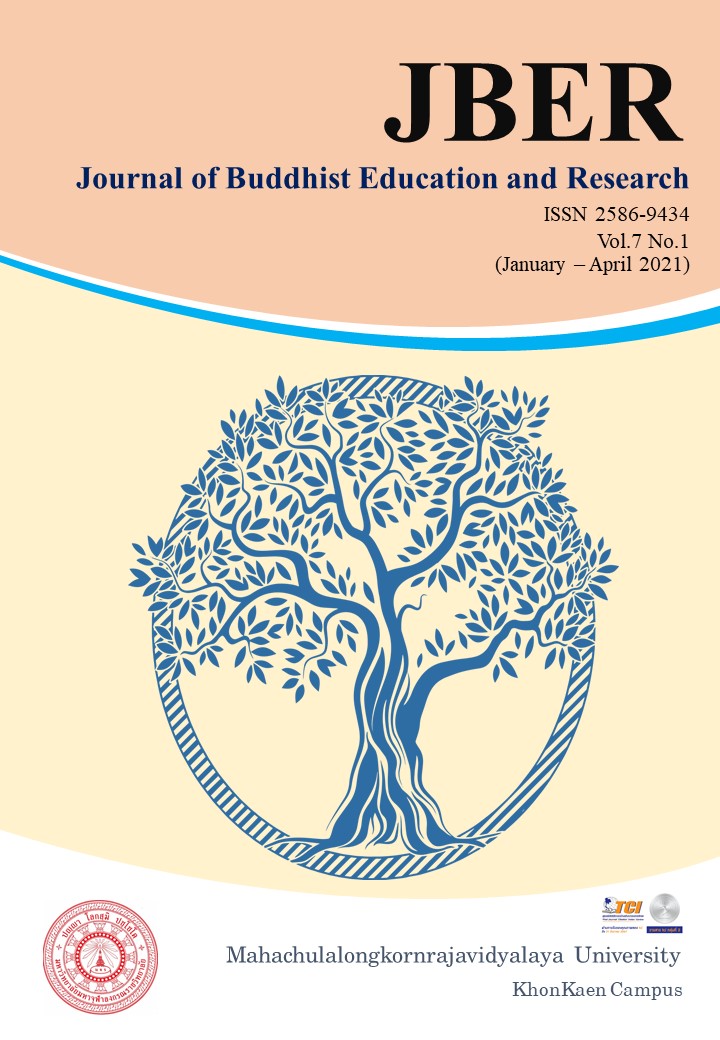The Learning Management of Social Studies in Accordance with Buddhism
Keywords:
learning management, social studies teaching, Buddhist approachAbstract
Social studies learning management is one of the most important courses in developing the competency of learners to be able to learn the ways to live in society to realize the change of society and being happy with other people. There is a method of teaching in transferring, training and exchange. The process of adjusting instruction or broadcasting teacher's knowledge to learners is a concept that adjusts the way of thinking and changing teaching methods by learning design teachers from asking questions for students to think and search for information, learn from a variety of activities, train learners to acquire lifelong learning skills. Social studies learning management is therefore important in developing learner characteristics to be good citizens with charity, creativity, belief in morality and ethics by integrating the principles of Buddhism in 3 ways: 1) learning must begin with oneself (Self Learning), i.e. teaching to have Chanda (aspiration), meaning the feeling of love in the things learned; learning to have Viriya (energy) and Citta (thoughtfulness), not abandoning education; and Vīmaṁsā (Investigation) which is self-examination to improve learning to be better; 2) learning must be coupled with practice (learning by doing) in getting the students to have wisdom; 3) learning must be coupled with fun (enjoy Learning)’ learners are happy to escape from ignorance, such as using ‘Play Way: Playing is Learning’, ‘storytelling’ or ‘case study’, or ‘giving real action’.
References
วิชัย ตันศิริ. (2547). โฉมหน้าการศึกษาไทยในอนาคต : แนวคิดสู่การปฏิรูปในพระราชบัญญัติการศึกษา. พิมพ์ครั้งที่ 4. กรุงเทพมหานคร: สำนักพิมพ์แห่งจุฬาลงกรณ์มหาวิทยาลัย.
พระพรหมคุณาภรณ์ (ป.อ.ปยุตฺโต). (2546). พุทธวิธีในการสอน. พิมพ์ครั้งที่ 18. กรุงเทพมหานคร: บริษัท พิมพ์สวย จำกัด.
มหาวิทยาลัยมหาจุฬาลงกรณราชวิทยาลัย. (2559). พุทธวิธีการสอน. พิมพ์ครั้งที่ 2 พระนครศรีอยุธยา: โรงพิมพ์มหาจุฬาลงกรณราชวิทยาลัย.
วิภาพรรณ พินลาและวิภาดา พินลา. (2561). การจัดการเรียนรู้สังคมศึกษาในยุคศตวรรษที่ 21. กรุงเทพมหานคร: โรงพิมพ์แห่งจุฬาลงกรณ์มหาวิทยาลัย.
Phra Witespromkhun and Wongsuwan, N. (2017). Buddhist Social Studies Material. Social Studies Teaching, Faculty of Education. Bangkok :
Mahachulalongkornrajavidyalaya University Press.
คณะกรรมการการศึกษาพระปริยัติธรรม แผนกสามัญศึกษา, หลักสูตรการศึกษาพระปริยัติธรรม แผนกสามัญศึกษา พ.ศ. 2558 ตามหลักสูตรแกนกลางการศึกษาขั้นพื้นฐาน พ.ศ. 2551, โรงพิมพ์สำนักงานพระพุทธศาสนาแห่งชาติ.
พระธรรมปิฎก (ป.อ.ปยุตฺโต), พจนานุกรมพุทธศาสตร์ ฉบับประมวลธรรม. พิมพ์ครั้งที่ 34. มูลนิธิการศึกษาเพื่อสันติภาพ พระธรรมปฎก (ป. อ. ปยุตฺโต), 2559.
Phra Dhammapitaka (P.A. Payutto). (1997). Buddhism for Human and Society Development. Bangkok : Local Press.
Phra Paisal Visalo. (2009). Thai Buddhism in the future. Bangkok: Komol Keemthong Foundation.
Sirimahasakorn, B. (2002). Human Emphasis Education as the Center of Development. Bangkok : Book Point.
Wannapok, S. (1999). Buddhist Teaching Methods in the Tipitaka. Second Printed. Bangkok : Amarin Book Centre Company.
Vitthaya Thongdee and Suphawit Rompaen. (2018) : The Approach to Develop Social Studies Teaching According to Buddhist Method at Thailand 4.0: Mahachulalongkornrajavidyalaya University, Khonkean Campus, Thailand





